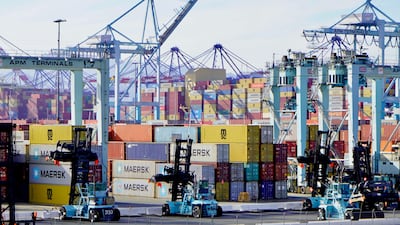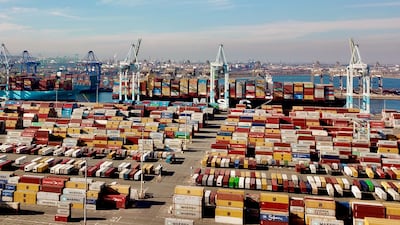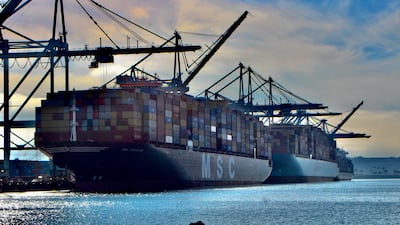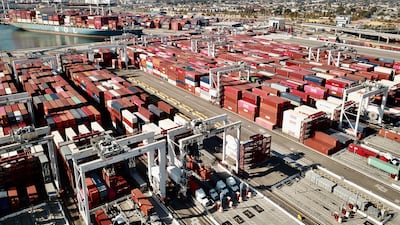On a hot, humid East Coast day this summer, a massive container ship pulled into the Port of Baltimore in Maryland loaded with sheets of plywood, aluminium rods and radioactive material — all sourced from the fields, forests and factories of Russia.
US President Joe Biden promised to “inflict pain” and deal “a crushing blow” on Russian President Vladimir Putin through trade restrictions on commodities such as vodka, diamonds and gasoline after Russia’s invasion of Ukraine six months ago. But hundreds of other types of unsanctioned goods worth billions of dollars, including those found on the ship bound for Baltimore from St Petersburg, continue arrive at US ports.
The Associated Press found more than 3,600 shipments of wood, metals, rubber and other goods have arrived at US ports from Russia since it began launching missiles and air strikes into its neighbour in February. That is a significant drop from the same period in 2021 when about 6,000 shipments arrived. However, it still adds up to more than $1 billion worth of commerce a month.
In reality, no one involved actually expected trade to drag to a halt after the invasion. Banning imports of certain items would likely do more harm to those sectors in the US than in Russia.
The Ukraine crisis - in pictures
“When we impose sanctions, it could disrupt global trade. So our job is to think about which sanctions deliver the most impact, while also allowing global trade to work,” ambassador Jim O’Brien, who heads the State Department’s Office of Sanctions Co-ordination, told the AP.
Experts say the global economy is so intertwined that sanctions must be limited in scope to avoid driving up prices in an already unstable market.
Also, US sanctions do not exist in a vacuum; layers of EU and UK bans result in convoluted trade rules that can be confusing to buyers, sellers and policymakers.
For example, the Biden administration and the EU released separate lists of Russian companies that cannot receive exports. However, at least one of those companies — which supplies the Russian military with metal to make fighter jets currently dropping bombs in Ukraine —- is still selling millions of dollars of metal to American and European firms, AP found.
While some US importers are sourcing alternative materials elsewhere, others say they have no choice. In the case of wood imports, Russia’s dense birch forests create such hard, strong timber that most American wooden classroom furniture, and much home flooring, is made from it. Shipping containers of Russian items — groats, weightlifting shoes, crypto mining gear, even pillows — arrive at US ports almost every day.
A breakdown of imported goods from Russia shows some items are clearly legal and even encouraged by the Biden administration. These include the more than 100 shipments of fertiliser that have arrived since the invasion. Now-banned products such as Russian oil and gas continued to arrive in US ports long after the announcement of sanctions owing to “wind-down” periods, allowing companies to complete existing contracts.
Los Angeles port - in pictures
In some cases, the origin of products shipped out of Russian ports can be difficult to discern. US energy companies are continuing to import oil from Kazakhstan through Russian ports, even though that oil is sometimes mixed with Russian fuel. Trade experts warn that Russian suppliers are unreliable, and opaque corporate structures of most major Russian companies make it difficult to determine whether they have ties to the government.
“It is a general rule: when you have sanctions, you’ll have all kinds of murky schemes and illicit trade,” said Russian economist Konstantin Sonin, who teaches at the University of Chicago. “Still, sanctions make sense because even though you cannot kill 100 per cent of revenue, you can reduce them.”
Russia and the US were never major trading partners, and so sanctioning imports is only a very small slice of the retaliatory strategy. Restrictions on exports from the US cause more damage to the Russian economy. Sanctioning the Russian Central Bank has frozen Russia’s access to roughly $600bn in currency reserves held across the US and Europe.
Nonetheless, sanctions carry a symbolic weight beyond the financial harm they might inflict, particularly for American consumers horrified by the war.
US sanctions more Russian oligarchs — in pictures
UAE squad
Esha Oza (captain), Al Maseera Jahangir, Emily Thomas, Heena Hotchandani, Indhuja Nandakumar, Katie Thompson, Lavanya Keny, Mehak Thakur, Michelle Botha, Rinitha Rajith, Samaira Dharnidharka, Siya Gokhale, Sashikala Silva, Suraksha Kotte, Theertha Satish (wicketkeeper) Udeni Kuruppuarachchige, Vaishnave Mahesh.
UAE tour of Zimbabwe
All matches in Bulawayo
Friday, Sept 26 – First ODI
Sunday, Sept 28 – Second ODI
Tuesday, Sept 30 – Third ODI
Thursday, Oct 2 – Fourth ODI
Sunday, Oct 5 – First T20I
Monday, Oct 6 – Second T20I
UPI facts
More than 2.2 million Indian tourists arrived in UAE in 2023
More than 3.5 million Indians reside in UAE
Indian tourists can make purchases in UAE using rupee accounts in India through QR-code-based UPI real-time payment systems
Indian residents in UAE can use their non-resident NRO and NRE accounts held in Indian banks linked to a UAE mobile number for UPI transactions
The specs
Engine: 3.5-litre twin-turbo V6
Power: 380hp at 5,800rpm
Torque: 530Nm at 1,300-4,500rpm
Transmission: Eight-speed auto
Price: From Dh299,000 ($81,415)
On sale: Now
The bio
Who inspires you?
I am in awe of the remarkable women in the Arab region, both big and small, pushing boundaries and becoming role models for generations. Emily Nasrallah was a writer, journalist, teacher and women’s rights activist
How do you relax?
Yoga relaxes me and helps me relieve tension, especially now when we’re practically chained to laptops and desks. I enjoy learning more about music and the history of famous music bands and genres.
What is favourite book?
The Perks of Being a Wallflower - I think I've read it more than 7 times
What is your favourite Arabic film?
Hala2 Lawen (Translation: Where Do We Go Now?) by Nadine Labaki
What is favourite English film?
Mamma Mia
Best piece of advice to someone looking for a career at Google?
If you’re interested in a career at Google, deep dive into the different career paths and pinpoint the space you want to join. When you know your space, you’re likely to identify the skills you need to develop.
MATCH INFO
Uefa Champions League, semi-final result:
Liverpool 4-0 Barcelona
Liverpool win 4-3 on aggregate
Champions Legaue final: June 1, Madrid
21 Lessons for the 21st Century
Yuval Noah Harari, Jonathan Cape
Water waste
In the UAE’s arid climate, small shrubs, bushes and flower beds usually require about six litres of water per square metre, daily. That increases to 12 litres per square metre a day for small trees, and 300 litres for palm trees.
Horticulturists suggest the best time for watering is before 8am or after 6pm, when water won't be dried up by the sun.
A global report published by the Water Resources Institute in August, ranked the UAE 10th out of 164 nations where water supplies are most stretched.
The Emirates is the world’s third largest per capita water consumer after the US and Canada.
The specs
Engine: 3.9-litre twin-turbo V8
Power: 620hp from 5,750-7,500rpm
Torque: 760Nm from 3,000-5,750rpm
Transmission: Eight-speed dual-clutch auto
On sale: Now
Price: From Dh1.05 million ($286,000)
More coverage from the Future Forum
TOURNAMENT INFO
Fixtures
Sunday January 5 - Oman v UAE
Monday January 6 - UAE v Namibia
Wednesday January 8 - Oman v Namibia
Thursday January 9 - Oman v UAE
Saturday January 11 - UAE v Namibia
Sunday January 12 – Oman v Namibia
UAE squad
Ahmed Raza (captain), Rohan Mustafa, Mohammed Usman, CP Rizwan, Waheed Ahmed, Zawar Farid, Darius D’Silva, Karthik Meiyappan, Jonathan Figy, Vriitya Aravind, Zahoor Khan, Junaid Siddique, Basil Hameed, Chirag Suri
Who was Alfred Nobel?
The Nobel Prize was created by wealthy Swedish chemist and entrepreneur Alfred Nobel.
- In his will he dictated that the bulk of his estate should be used to fund "prizes to those who, during the preceding year, have conferred the greatest benefit to humankind".
- Nobel is best known as the inventor of dynamite, but also wrote poetry and drama and could speak Russian, French, English and German by the age of 17. The five original prize categories reflect the interests closest to his heart.
- Nobel died in 1896 but it took until 1901, following a legal battle over his will, before the first prizes were awarded.
The National's picks
4.35pm: Tilal Al Khalediah
5.10pm: Continous
5.45pm: Raging Torrent
6.20pm: West Acre
7pm: Flood Zone
7.40pm: Straight No Chaser
8.15pm: Romantic Warrior
8.50pm: Calandogan
9.30pm: Forever Young
THE SIXTH SENSE
Starring: Bruce Willis, Toni Collette, Hayley Joel Osment
Director: M. Night Shyamalan
Rating: 5/5
More on Quran memorisation:

































